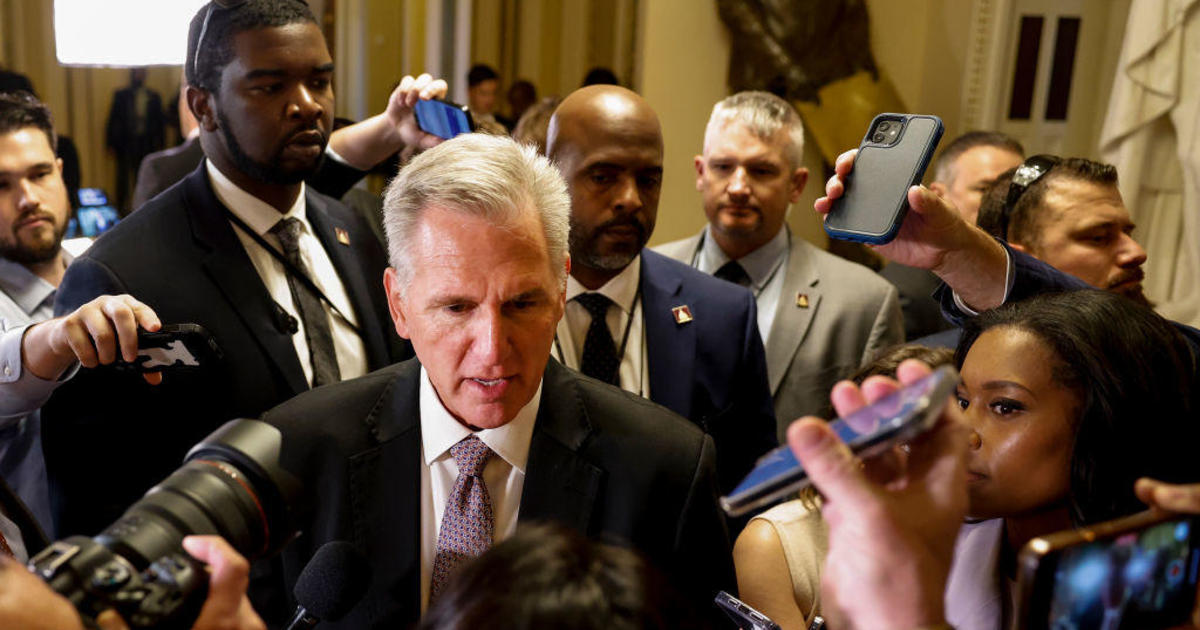Main Topic: Congress likely to pass a short-term government funding bill to avoid a shutdown this fall.
Key Points:
1. Speaker Kevin McCarthy believes a short-term funding bill is necessary due to lack of time for a full-year funding deal.
2. The length of the stopgap bill and policy terms still need to be agreed upon by congressional leaders.
3. The House and Senate are moving in different directions on appropriations, with the House seeking spending cuts and conservative policy provisions, while the Senate aims for bipartisan support and avoids controversial provisions.
Lawmakers in the United States have a limited amount of time to pass crucial spending legislation and avoid a government shutdown, which could have major impacts on federal agencies, federal employees, and various services provided to Americans.
House GOP leaders are considering avoiding a government shutdown by approving a short-term continuing resolution instead of a massive bill to fund the Pentagon, as they face demands from hardliners for deeper spending cuts and specific funding levels.
There is a possibility of a government shutdown as Congress faces a deadline to pass 12 spending bills, with the most likely scenario being a continuing resolution to extend last year's spending levels for a designated period of time.
Lawmakers in Congress are facing a potential government shutdown at the end of the month, with the possibility of a shutdown becoming increasingly inevitable due to the lack of progress in negotiations and disputes between House Speaker Kevin McCarthy, hardliners in his party, and the US Senate.
Some swing district Republican lawmakers are considering working with Democrats to avert or shorten a government shutdown by utilizing a procedural step known as a "discharge petition" to force a vote on a clean spending bill.
Minnesota Democrat Rep. Angie Craig has introduced a bill called the MCCARTHY Shutdown Act, which would withhold pay from members of Congress during a government shutdown to ensure they experience the same financial hardships as federal workers.
If Congress fails to provide funding for the fiscal year starting Oct. 1, many U.S. government services would be disrupted, federal workers would be furloughed without pay, and essential workers would remain on the job without pay.
A bipartisan group of Senators and House members are pushing for legislation that would automatically fund the government past spending deadlines, effectively ending shutdown threats.
Millions of government employees face the prospect of not receiving their paychecks at the end of the month and are preparing for financial hardships as Congress nears a government shutdown.
Lawmakers in the U.S. House and Senate have until September 30 to pass a spending bill to fund the government and avoid a shutdown, with Republican and Democrat leaders trying to navigate internal disagreements in their respective parties.
The Republican-controlled House of Representatives is attempting to advance spending cuts that are unlikely to become law, potentially leading to a partial government shutdown, as some members of the party threaten to depose House Speaker Kevin McCarthy if he does not support steeper cuts.
Lawmakers are facing a tight deadline to reach an agreement on a budget resolution to avoid a government shutdown as spending laws are set to expire on September 30. House Republicans, led by Speaker Kevin McCarthy, are struggling to unite the GOP caucus and secure enough votes for a deal, while Democratic support would come with political consequences. Failure to reach an agreement would result in paused paychecks for federal employees and disruption of government services.
A potential government shutdown looms as Congress struggles to pass a funding bill by Saturday night, which could result in federal workers going without pay and essential services continuing while non-essential services halt.
Unless Congress acts soon, the federal government is at risk of shutting down again, leaving millions of federal workers without pay, as House Speaker Kevin McCarthy and his caucus clash over maintaining government operations or implementing drastic spending cuts demanded by conservatives.
Congress is facing challenges in funding the government and avoiding a shutdown due to divergent spending plans and parliamentary mechanics.
Federal agencies are warning their workers of a possible government shutdown, where employees may not receive pay, if Congress fails to reach a funding deal by the end of September 30th.
Congress's failure to pass the 12 yearlong spending bills that fund the federal government has led to a looming shutdown, leaving lawmakers scrambling to find a bipartisan solution to temporarily fund federal agencies and avoid a shutdown.
Lawmakers return to Congress with no clear resolution to avoid a government shutdown, as Republicans and Democrats remain divided on spending bills just hours before funding runs out.
Congress passed a stopgap funding bill to keep the government open through mid-November, avoiding a shutdown that would have had devastating effects, allowing federal workers to continue receiving pay and preventing disruptions to air travel and relief efforts in the wake of natural disasters.
Congress passes a short-term spending bill to avert a government shutdown, which President Biden signed into law, funding the government through November 17.
